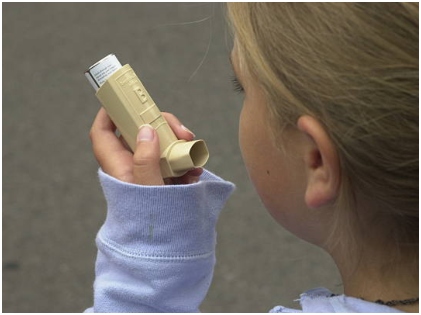
Ways To Treat Asthma At Home And Without Taking Medicines

 Asthma is a chronic disease that induces inflammation in the lungs, precisely in the airways of it. The swelling made the airways shrink slowly than their usual sizes, making it harder for you to breathe. Additionally, you might feel an increased mucus level in your throat and an uneasy feeling of strangling in your chest.
Asthma is a chronic disease that induces inflammation in the lungs, precisely in the airways of it. The swelling made the airways shrink slowly than their usual sizes, making it harder for you to breathe. Additionally, you might feel an increased mucus level in your throat and an uneasy feeling of strangling in your chest.
This is what they call an ‘asthma attack.’ Like many other chronic diseases, asthma has no cure, but we can keep it in check for a while or even longer with proper medication. But for a chronic disease like asthma, home remedies can play a key role along with medication and a conventional treatment plan, to keep symptoms at bay. Here are a few ways how you can treat asthma at home.
Self-care Is The Best Care
Asthma remains a chronic disease and has no cure in medical science. All we can do is to get a hold of it by improving some daily habits of living. When you team it with the prescription medication, and these little self-care hacks might prove fruitful in the long run.
Besides, the responsibility of individuals and their activities are essential to prevent the attacks. Self-care doesn’t mean to stop intaking medicines. It simply means to provide additional care to your body and to take preventive measures prior.
Identify Your Triggers
 Asthma is more like an allergic reaction, triggered by some common or rare triggers. So it is very important to identify triggers to stay away from those in the first place. In case you have to stay with them, consider eliminating those instead.
Asthma is more like an allergic reaction, triggered by some common or rare triggers. So it is very important to identify triggers to stay away from those in the first place. In case you have to stay with them, consider eliminating those instead.
Although these triggers vary from person to person, they can create havoc if they remain active. According to the Centers for Disease Control and Prevention (CDC), some of the most common triggers are smoke from fossil fuel and tobacco during smoking, dust mites, household pets, pollens, mold, exercise, etc.
Eliminate The Triggers
Find any of these elements as your common trigger. You can then take the necessary actions to avoid them. This includes preventing passive smoking, suggesting that others not smoke when you’re around, or encourage them to quit if possible. Vacuum your household stuff like cushions, sofa, bed, floor regularly to avoid dust mites.
Close your windows if you live around any polluted area. You can also try air purifiers or air filters to clean the air inside your room. Gone are those days when air purifiers were a luxury, now it has become a necessity for asthma patients. In case you have pets, then keep them in a separate room to prevent their hair from making an entry into your bedroom. Also, wash your clothes regularly.
Improved Lifestyle Practice
Aside from identifying and eliminating common triggers, one has to improve their conventional lifestyle practice to stay fit. You might be wondering how this is related to the topic of asthma, but being active to a certain level will only do good for you and help prevent the chances of an asthma attack.
For instance, If you are a chain smoker having asthma, then smoking will cause severe damage to your lungs, more than a person without asthma. Due to asthma, your lung’s airways have already shrunk to an extent.
Additionally, the inhaled smoke might swell them anytime to cause an instant asthma attack. Also, keep your weight healthy and continue doing moderate exercises to stay active. Stress can be a potential reason for an asthma attack. So, practice stress management techniques well while getting enough sleep regularly.
Practice Yoga and Deep Breathing Exercises
 Yoga is an effective home remedy to control asthmatic symptoms for extended periods. People who practice yoga asanas, deep breathing techniques, and Pranayama live a healthier life.
Yoga is an effective home remedy to control asthmatic symptoms for extended periods. People who practice yoga asanas, deep breathing techniques, and Pranayama live a healthier life.
During the deep breathing exercises, more airflow goes into the lungs’ airways, keeping the lungs healthy for a longer period. After a short stint of yoga practice, you might notice your wheezing in the lungs has gone away.
These lifestyle changes and home remedies will keep your asthma under control. However, that does not mean that you should stop your medication. Continue to follow your physician’s suggestions along with these tips, and you will soon be on a fast-track to health. Stay healthy, stay safe!
More in Treatment
-
`
5 Reasons Why Dad’s Side of the Family Misses Out
Family bonds are intricate and multifaceted, often creating a unique tapestry of connections. However, many people notice a peculiar trend: stronger...
July 12, 2024 -
`
A Quick Guide on How to Get Short-Term Disability Approved for Anxiety and Depression
Living with anxiety or depression poses unique challenges, particularly in the workplace, where stress can exacerbate symptoms. For many, short-term disability...
July 5, 2024 -
`
Why Do People Feel Sleepy After Eating?
Is feeling sleepy after eating a sign of diabetes? Well, not directly. There are many reasons why you feel drowsy after...
June 20, 2024 -
`
What Is High-Functioning Depression? Symptoms and Treatment
High-functioning depression may not be a term you hear every day, but it’s a very real and challenging experience for many....
June 13, 2024 -
`
Kelly Clarkson’s Weight Loss Ozempic Journey – Debunking the Rumors
In a refreshing moment of transparency, Kelly Clarkson, the beloved singer and talk show host, sheds light on her remarkable weight...
June 3, 2024 -
`
What Is the Best Milk for Gut Health and Why?
In recent years, the milk section at the grocery store has expanded far beyond the traditional options. While cow’s milk has...
May 30, 2024 -
`
Do Dental Implants Hurt? Here’s All You Need to Know
When you hear “dental implants,” you might wince at the thought of pain. But do dental implants hurt as much as...
May 24, 2024 -
`
5 Key Differences Between A Psych Ward & A Mental Hospital
Curious about the differences between a psych ward and a mental hospital? You are not alone. With the mental health conversation...
May 16, 2024 -
`
It’s Official! “Selling Sunset’s” Christine Quinn & Husband Christian Dumontet Are Parting Ways
Have you ever found yourself unexpectedly engrossed in the personal lives of celebrities, especially when their stories take dramatic turns? Well,...
May 9, 2024










You must be logged in to post a comment Login